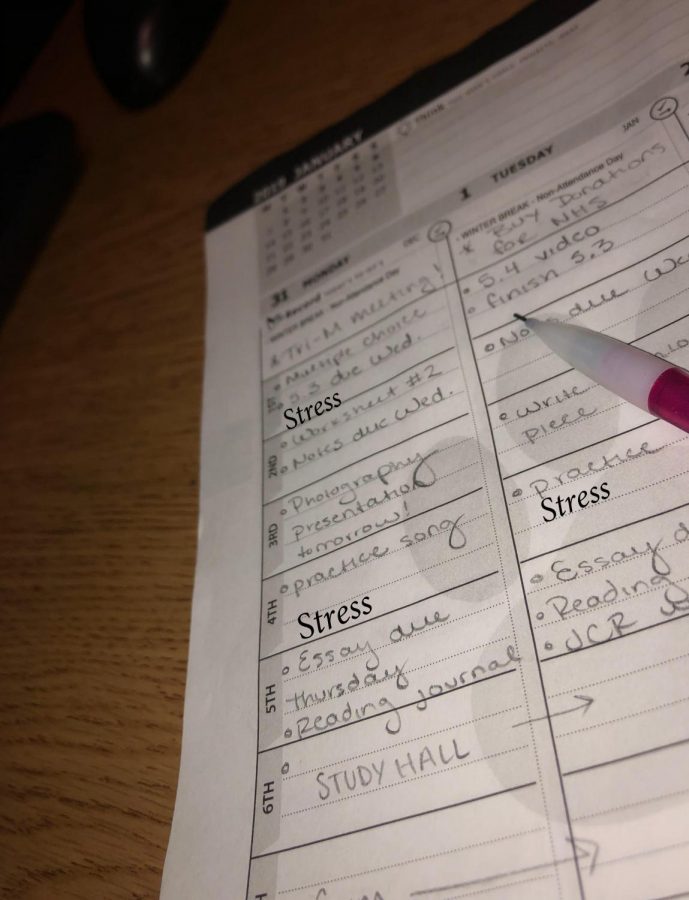High school class system is the reason for students’ disinterest in school
March 15, 2019
In order for society to thrive, the world needs diversity. Every individual has different talents and interests which bring something new to the table. However, our education system in America is prohibiting students from choosing classes for themselves, which does not allow students to demonstrate their unique abilities happily and without reluctance.
According to NBC, “many are simply saying ‘I don’t know’ when it comes to what they want to be when they grow up, a new study shows.” As a high school student myself, I know firsthand how other students, as well as myself, have been negatively impacted by such a strict class system.
Although a wide variety of required classes is beneficial in earlier years, as high school students, we don’t have the choice to pursue what interests us. We as a nation must realize that this system prohibits students like me to freely learn, and learn with intention.
Implementing a student-chosen class system would result in a variety of benefits for students, for students’ futures, and for the future of our nation.
If you ask a child what they want to be when they grow up, they enthusiastically say they want to be firefighters, animal doctors, or ballet dancers. But if you ask a teenager in middle school or high school, they are uncertain about their future plans, and on top of that, stressed because the school class system has more or less cheated them from being able to choose disciplines with an open mind.
The current class system is forcing these students to become hesitant and even weaker in the areas of school they actually enjoy.
Let’s say a certain student really wants to become a writer: How would a full year of Geometry class benefit them? How would three entire years of a full-year science class help them reach that goal? In light of our different skill levels, and our vastly different interests, certain classes are not for everyone.
Forcing students to take certain classes prohibits them from having more time in their schedule to pursue other classes of interest. The strict class system essentially deprives students of being able to master what they truly love and are good at. Without this willing focus which stems from choosing classes that interest a student, the desire to learn becomes nonexistent; students are not able to express their interests to the world or become well equipped for higher education in the area(s) they love.
Individuality seems to not be a true priority in American classrooms. Students are bored, lazy, and tired. Procrastination and stress are common words associated with school because students are forced to take unnecessary classes that disinterest them. Children feel pressure to be good at all areas of study, and this should not be the case. Mastering one or a few specific skills that you love would benefit our society much more than being mediocre in many different areas.
Adults should understand this more than anyone. Many have lived out the effects of this weak system. They are the ones who can step up to change this, along with the advocation of students affected today.
US News reported that “Of the country’s approximately 100 million full-time employees, 51 percent aren’t engaged at work— meaning they feel no real connection to their jobs, and thus they tend to do the bare minimum.” How is this acceptable? Nowadays, adults are choosing a major in college, or going in undecided, and graduating without any drive or happiness because they could never truly zone in on the subjects they actually love before committing to something they weren’t sure of. When they enter the workforce, over half of our adult population is disinterested in their livelihood, and either spend the rest of their lives doing what they hate, or go back to college to become only adequately educated in what they really love (and spending large sums of money and time to do it). It is wasting the students’ money and time to be forced to learn certain things that have no importance going forward in their future career paths.
Teachers would benefit greatly from a student-chosen class system as well. If students are engaged, teachers will be too. The classroom would not seem like a boring lecture, but would be a space where students actually want to gain knowledge from their teachers, and share ideas freely. This enthusiastic environment will prompt kids to do homework with less reluctance, and teachers will be surrounded by students who respect their ideas and teachings because they are of interest to them.
Many say that students must take many different subjects in order to be well rounded, and be able to find what they really peaks their interests. And although this should be the case in the early years of learning, there is no use to this in higher levels of education such as high school. High school students already understand the basics of the core subjects, and high school should be a time to explore options. If a student wants to learn about many different subjects, so be it, but they should not be forced to.
By limiting students, they study subjects they don’t truly love, and they are uninterested and lose the desire to learn and be curious. Teachers are not content, and students are disengaged.
To promote a happier, more interesting, and healthier school experience for students, we must understand that we are not allowing students to be themselves, and the class system must be a reflection of what students desire to learn more about rather than what certain standardized tests or what society thinks everyone should learn. No one is the same, and no one should be treated as such. School should be a reflection of society, however with this class system, society seems to be a place of disinterest, stress, and conformity rather than a place of happiness, unique ideas, and a place of personalities coming together to shape the world.




DJ Degand • Mar 15, 2019 at 10:09 am
sick article bro